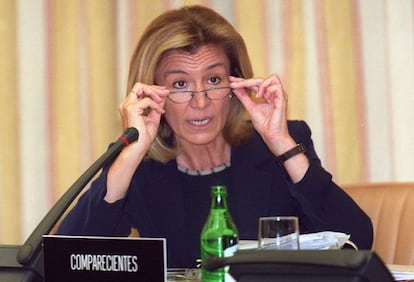Tax inspector with questionable past gets eyebrow-raising promotion
Pilar Valiente was forced to resign from securities commission over massive financial scandal

When Finance Minister Cristóbal Montoro appointed Pilar Valiente as the number two in the tax fraud investigations division at the internal revenue agency (AEAT) last month, many did a double take. Just 11 years ago, Valiente was forced to resign her post as chairwoman of the stock market watchdog CNMV after she became enmeshed in a fraud scandal involving the dodgy brokerage firm, Gescartera.
But what raised eyebrows the most is that Valiente, according to the SER radio network, reportedly asked her Popular Party (PP) superiors to get rid of all of the workers at the National Office of Fraud Investigations (ONIF) who took part in uncovering the Gürtel contracts-for-kickbacks scheme in PP-controlled regions.
The squad replaced was also responsible for investigating the businesses of indicted royal son-in-law Iñaki Urdangarin and his non-profit Nóos Institute, which is at the center of a diversion of public funds court inquiry in the Balearics. Chief investigator Víctor de la Morena, who was in charge of many criminal probes, was among those replaced. The firings come at crucial times in both investigations.
Before being made number two at ONIF, Valiente was a regular tax inspector.
In September 2001, she resigned from the CNMV - a position given to her by the previous PP administration of José María Aznar - after the so-called Gescartera scandal broke and the agenda of the brokerage's manager was leaked to the press.
Valiente was caught up in a scandal involving the dodgy brokerage Gescartera
Hundreds of investors filed complaints with the CNMV against the firm's owner Antonio Rafael Camacho after their money disappeared. Among those losing out were Catholic Church officials, the Navy's pensioners, charities and government officials.
But some clients favored by Camacho, including the archdiocese in Valladolid, had been tipped off beforehand and withdrew their money before the funds' collapse.
Camacho, a flamboyant businessman with many government connections and a liking for expensive suits, was eventually sentenced to 11 years in prison and fined 263,238 euros.
The CNMV's investigation was in full swing when a newspaper at the time published an agenda entry written by Pilar Giménez Reyes, the managing director of Gescartera and sister to then-deputy finance minister, Enrique Giménez Reyes.
In her April 16, 1999 entry, she wrote about CNMV officials' plans to intercede. "We only have Pilar Valiente, tell her to advise us quickly."
She was promoted from the ranks when the PP government took over
This entry, along with other information that allegedly demonstrated that Valiente was working behind the scenes at CNMV to help Gescartera cover up its holes, forced her to resign on September 20, 2001 - 11 months after getting the job. One document indicated that Valiente, during a CNMV board debate, was against any type of intervention.
Valiente maintained that she had no knowledge of Gescartera's finances. "I am not only leaving with a very clear conscience but also - and I want it to be known - with my professional honor absolutely intact," she told reporters that day. Enrique Giménez Reyes also resigned.
At the time, the then opposition Socialist leader José Luis Rodríguez Zapatero called for the resignations of both Economy Minister Rodrigo Rato and Finance Minister Cristóbal Montoro. Montoro said at the time that he didn't know Camacho. EL PAÍS gained access to a batch of email correspondence between CNMV officials mentioning that Rato's chief of staff had sat in on some of the meetings where decisions were made whether to take over Gescartera. Rato denied there was any government pressure to discard the Gescartera inquiry.
Besides Camacho, 13 other people went to trial. Pilar Giménez Reyes and two other Gescartera officials were given eight-year sentences.
Valiente's own appointments at the CNMV were also questionable. As soon as she came on board in October 1999, she promoted Antonio Botella to the job of supervision chief following the resignation of David Vives, who discovered the irregularities in Gescartera. Just months before Botella had certified documents that turned out to be false bank statements given to the CNMV by Camacho to cover up the first cracks that began to appear in the firm's accounts.
Now Valiente's new boss at the ONIF is Santiago Méndez, another Aznar appointee who was head of the revenue division at AEAT.
While government officials refused to comment about the changes at ONIF, sources explained that the replacements were "normal procedure" for any incoming administration. But all the tax inspectors who were transferred were career employees and not political appointees. When a new government assumes office, only the ONIF chief and deputy director are normally replaced, not the entire division.
Tu suscripción se está usando en otro dispositivo
¿Quieres añadir otro usuario a tu suscripción?
Si continúas leyendo en este dispositivo, no se podrá leer en el otro.
FlechaTu suscripción se está usando en otro dispositivo y solo puedes acceder a EL PAÍS desde un dispositivo a la vez.
Si quieres compartir tu cuenta, cambia tu suscripción a la modalidad Premium, así podrás añadir otro usuario. Cada uno accederá con su propia cuenta de email, lo que os permitirá personalizar vuestra experiencia en EL PAÍS.
¿Tienes una suscripción de empresa? Accede aquí para contratar más cuentas.
En el caso de no saber quién está usando tu cuenta, te recomendamos cambiar tu contraseña aquí.
Si decides continuar compartiendo tu cuenta, este mensaje se mostrará en tu dispositivo y en el de la otra persona que está usando tu cuenta de forma indefinida, afectando a tu experiencia de lectura. Puedes consultar aquí los términos y condiciones de la suscripción digital.








































